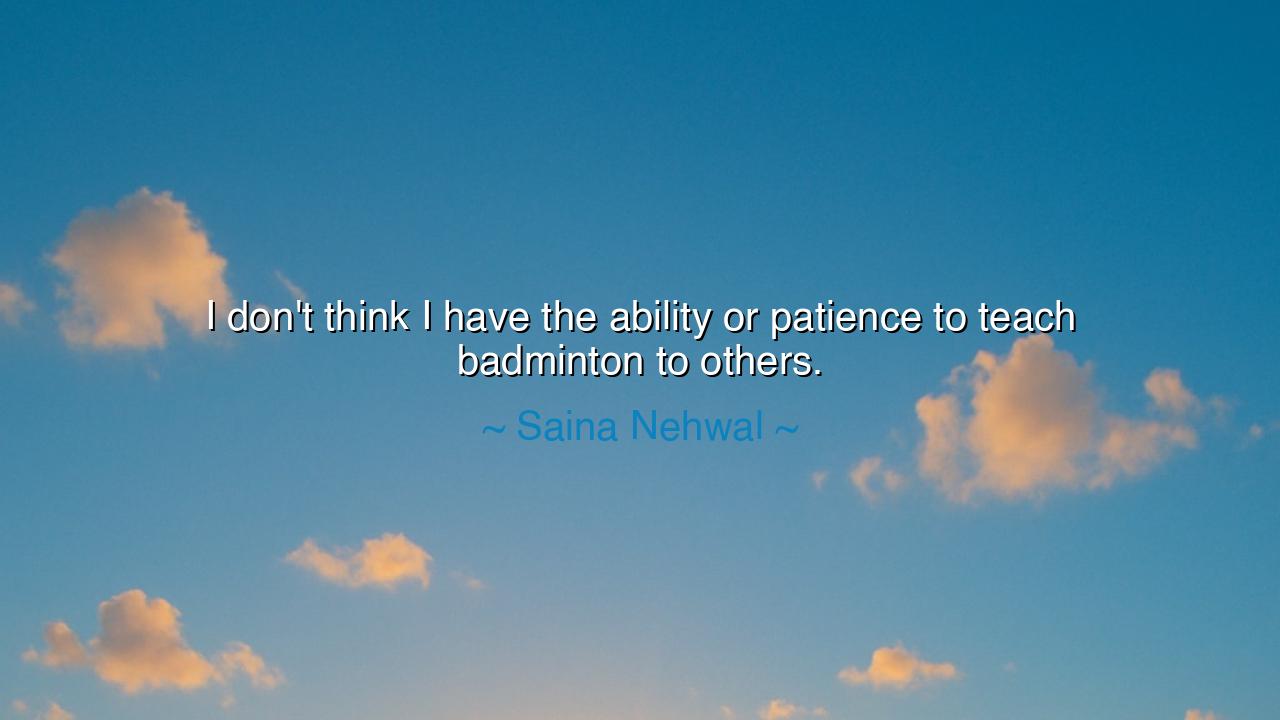
I don't think I have the ability or patience to teach badminton






Hear the candid words of Saina Nehwal, warrior of the court and bearer of her nation’s pride, who declared with humility: “I don’t think I have the ability or patience to teach badminton to others.” These words strike not as weakness, but as honesty, for they reveal the difference between the fire of a player and the calm of a teacher. To compete is to unleash power, precision, and focus. To teach is to restrain, to explain, to nurture slowly what burns fiercely within. And so Nehwal confesses that though she has mastered her sport, she may not possess the patience required to pass it on.
The origin of this saying lies in the life of Saina Nehwal, the first Indian woman to reach Olympic badminton glory, who carried on her shoulders the weight of a billion hopes. Trained with relentless discipline, she rose not by teaching but by striving, not by guiding others but by conquering herself. Her path was one of solitary endurance, forged through pain, sweat, and sacrifice. In this journey, she discovered the truth: the skills of a champion do not always translate into the skills of a teacher. For the battlefield of the court and the classroom of instruction demand different strengths.
Consider the difference: on the court, Nehwal wielded speed, reflex, and ferocity, striking with instinct honed by endless hours of practice. But to teach, one must slow down, repeat, endure mistakes, and patiently guide a student whose body does not yet obey. Many great warriors of history have spoken the same truth. Alexander the Great conquered vast lands, yet it was his teacher Aristotle who sowed in him the seeds of wisdom. The sword of conquest and the voice of instruction rarely dwell in the same hand.
This distinction is not failure but design. For in life, some are called to achieve, and others to teach; both are sacred roles. The athlete who wins glory on the world stage inspires through action, showing what is possible. The teacher, often hidden from fame, nurtures many so that the flame of skill spreads far beyond one person. Nehwal, by admitting her lack of patience to teach, affirms that her gift lies in living the example of excellence, not in shaping the hands of beginners. Her honesty preserves the dignity of both roles.
History offers us another mirror in Beethoven, who composed music that transcended centuries, yet struggled to teach his students with patience. His genius burned too fiercely to slow for others, and he often despaired of their slowness. Yet his works became their own teachers, inspiring countless musicians long after his death. So too, Nehwal’s matches, her victories, and her resilience are lessons in themselves, teaching a generation without her having to stand as coach.
The heart of her wisdom lies in the recognition of patience. Patience is the soil in which teaching grows, yet not all are gifted with its abundance. To admit its absence is not shame but clarity, for by doing so, one avoids frustration and dishonor. In her words, Nehwal teaches us that self-knowledge is the beginning of wisdom: to know not only what one can do, but what one cannot.
So I say to you, children of tomorrow: do not confuse greatness in doing with greatness in teaching. Honor both the champion and the guide, for each serves the growth of humanity in different ways. If you find in yourself the spirit of the competitor, then strive, achieve, and inspire by your deeds. If you find in yourself the spirit of the teacher, then cultivate patience, and guide others gently toward their own excellence. And if you lack one gift, as Nehwal admits she lacks patience, do not despair—for in your honesty, you teach a lesson greater than skill: the lesson of self-knowledge, humility, and truth.






AAdministratorAdministrator
Welcome, honored guests. Please leave a comment, we will respond soon